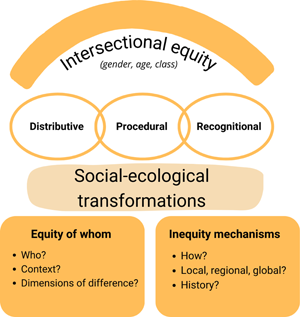Research Article
Reflexivity as a transformative capacity for sustainability science: introducing a critical systems approach
- Part of:
-
- Published online by Cambridge University Press:
- 10 January 2025, e1
-
- Article
-
- You have access
- Open access
- HTML
- Export citation
Review Article
Toward an intersectional equity approach in social–ecological transformations
- Part of:
-
- Published online by Cambridge University Press:
- 13 February 2025, e2
-
- Article
-
- You have access
- Open access
- HTML
- Export citation
Research Article
Financial foundations for sustainability: how business sophistication, tax policy, and technology shape ESG in belt and road initiative countries
-
- Published online by Cambridge University Press:
- 11 March 2025, e3
-
- Article
-
- You have access
- Open access
- HTML
- Export citation
The polycrisis and the uncertainty possibility space
- Part of:
-
- Published online by Cambridge University Press:
- 18 February 2025, e4
-
- Article
-
- You have access
- Open access
- HTML
- Export citation
Review Article
A systematic review of assessing climate change risks on species and ecosystems: bibliometric overview, concepts, approaches, and trends
- Part of:
-
- Published online by Cambridge University Press:
- 18 February 2025, e5
-
- Article
-
- You have access
- Open access
- HTML
- Export citation
Intelligence Briefing
Navigating systemic risks in low-carbon energy transitions in an era of global polycrisis
- Part of:
-
- Published online by Cambridge University Press:
- 18 February 2025, e6
-
- Article
-
- You have access
- Open access
- HTML
- Export citation
Concepts and Perspectives
Capitalism, complexity, and polycrisis: toward neo-Gramscian polycrisis analysis
- Part of:
-
- Published online by Cambridge University Press:
- 18 February 2025, e7
-
- Article
-
- You have access
- Open access
- HTML
- Export citation
Research Article
Liberal environmentalism and climate change in the polycrisis
- Part of:
-
- Published online by Cambridge University Press:
- 17 March 2025, e8
-
- Article
-
- You have access
- Open access
- HTML
- Export citation
Concepts and Perspectives
The social pathology of polycrisis
- Part of:
-
- Published online by Cambridge University Press:
- 19 March 2025, e9
-
- Article
-
- You have access
- Open access
- HTML
- Export citation
Research Article
Consumers' values and preferences for long-term policies in multifaceted rice production and consumption: a deliberative experiment incorporating the perspective of future generations in 2050
-
- Published online by Cambridge University Press:
- 07 February 2025, e10
-
- Article
-
- You have access
- Open access
- HTML
- Export citation
How do crises spread? The polycrisis and crisis transmission
- Part of:
-
- Published online by Cambridge University Press:
- 31 March 2025, e11
-
- Article
-
- You have access
- Open access
- HTML
- Export citation
Concepts and Perspectives
What comes after the polycrisis?
- Part of:
-
- Published online by Cambridge University Press:
- 17 March 2025, e12
-
- Article
-
- You have access
- Open access
- HTML
- Export citation
Research Article
Unraveling deep roots in drylands: a systems thinking participatory approach to SDGs
-
- Published online by Cambridge University Press:
- 21 February 2025, e13
-
- Article
-
- You have access
- Open access
- HTML
- Export citation
Revolution in an age of polycrisis
- Part of:
-
- Published online by Cambridge University Press:
- 17 March 2025, e14
-
- Article
-
- You have access
- Open access
- HTML
- Export citation
Nature connectedness and other transformative qualities associated with pro-environmental attitudes, behaviors, and engagement across scales: the direction of compassion matters
-
- Published online by Cambridge University Press:
- 10 April 2025, e15
-
- Article
-
- You have access
- Open access
- HTML
- Export citation
Review Article
Beyond green chemistry: a comprehensive review of how sustainability has been integrated into cosmetic research
-
- Published online by Cambridge University Press:
- 12 February 2025, e16
-
- Article
-
- You have access
- Open access
- HTML
- Export citation

